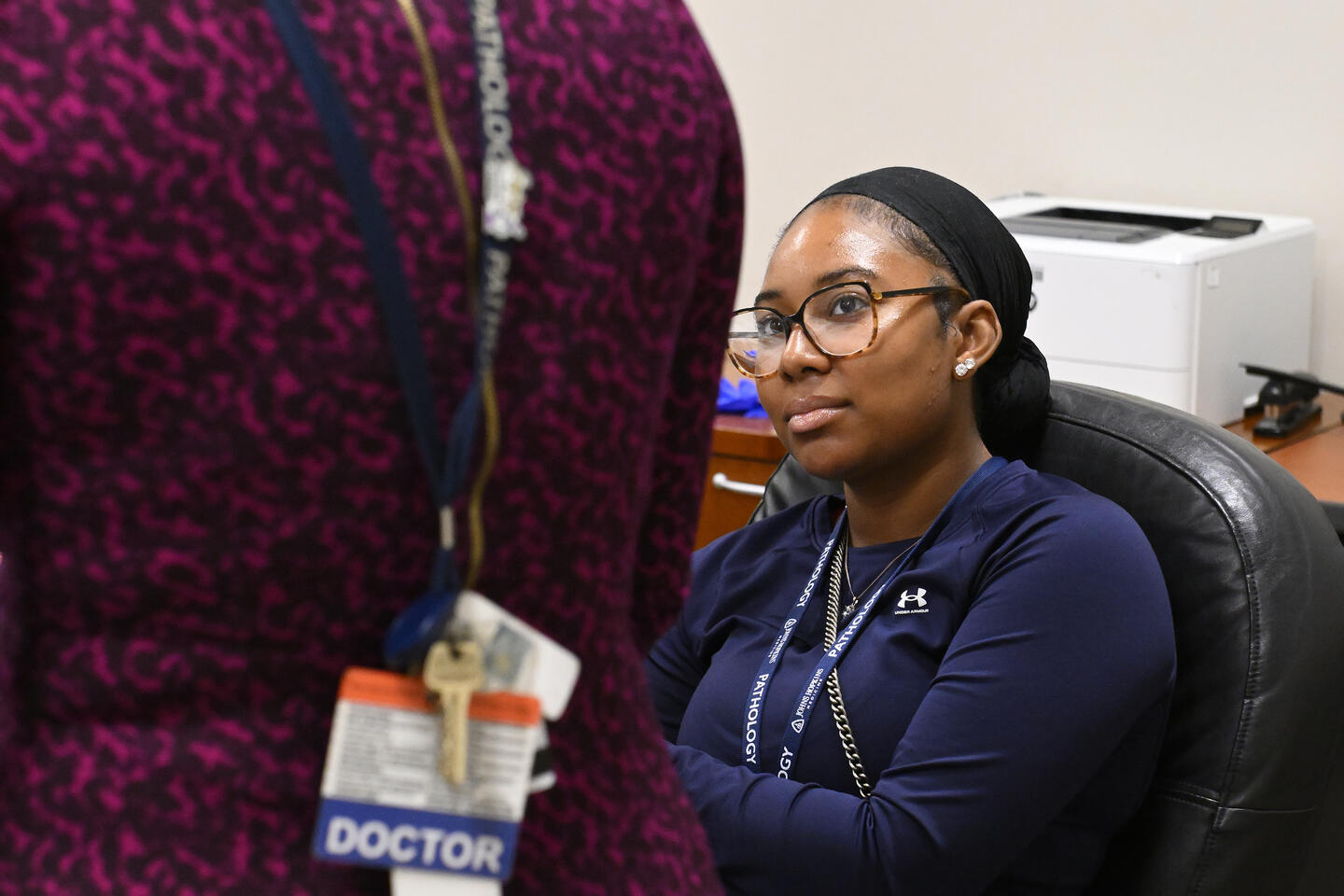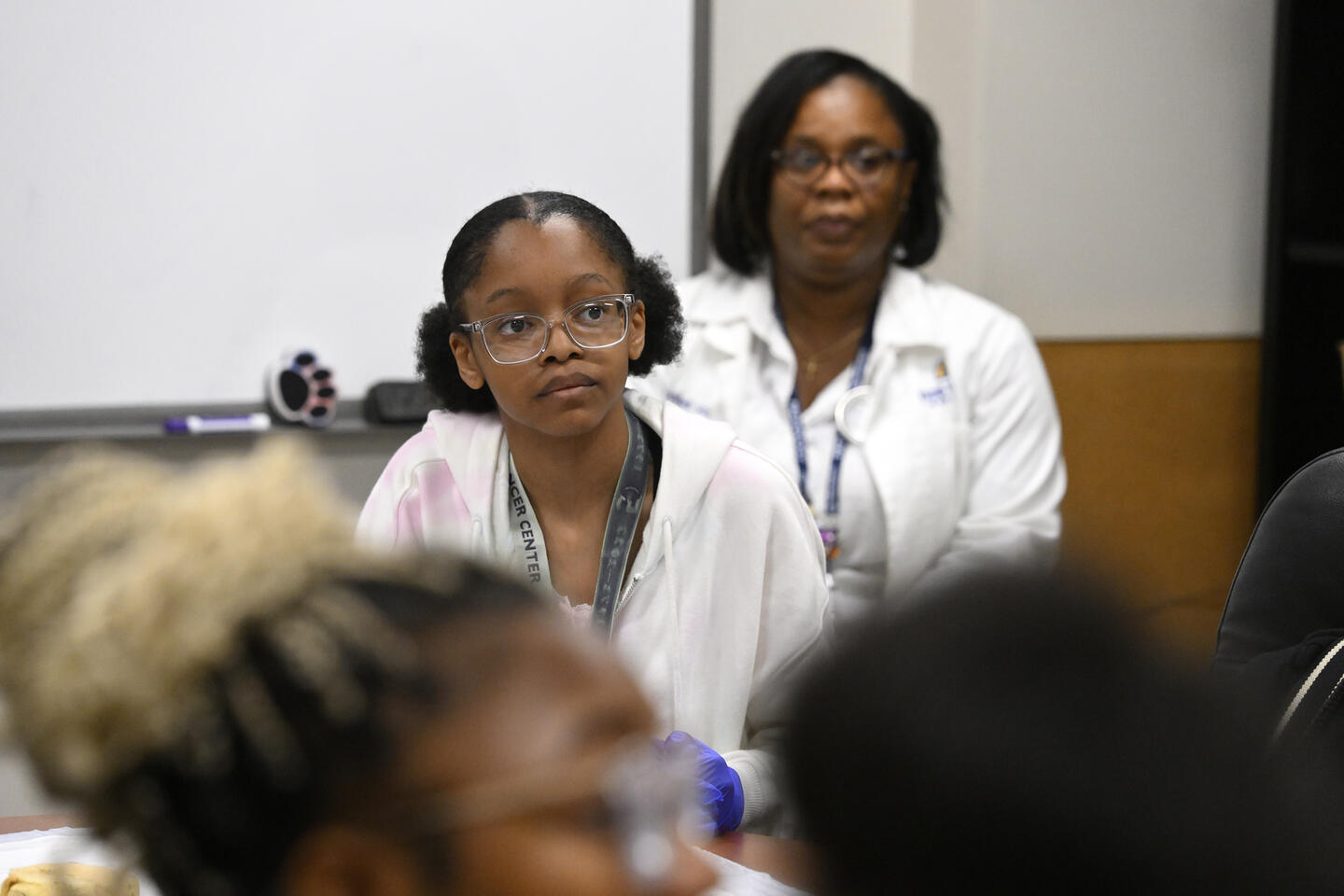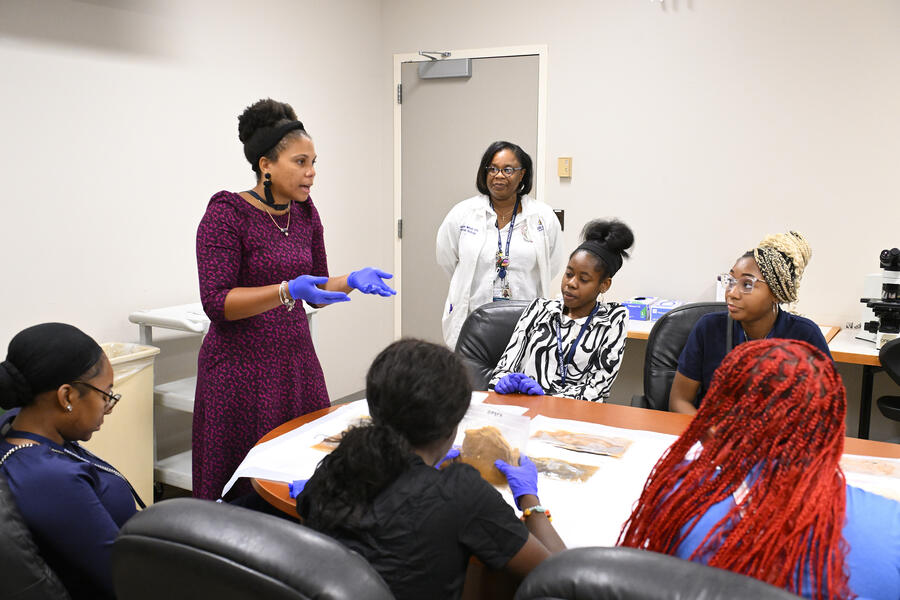At Johns Hopkins University and Medicine locations across the country, high school and college students are taking part in a tradition 30 years in the making: the Summer Jobs Program, a joint venture between Hopkins and YouthWorks that provides diverse youth with paid internships in health care settings.
The program began in 1994, when Deborah Knight-Kerr became the Johns Hopkins Health System's first director of Community and Education Projects. Wanting to build on YouthWorks' already-existing program, which connected Baltimore City teens with summer jobs, Knight-Kerr partnered with the governmental organization to create the Summer Jobs Program.

Image credit: Will Kirk / Johns Hopkins University
Its inaugural class included around 25 high school students. That number has since grown exponentially; JHSJP Youth Program Manager Spencer Carroll estimates that 8,000 to 9,000 students have participated in the past 30 years.
The tremendous growth of the program over 30 years was made possible by university and health system investment. Johns Hopkins fully funds the paid positions, with no costs involved for the participating departments. JHU President Ron Daniels also supported a key investment in 2015 to subsidize 100 additional internship slots, helping the program reach 300 students annually. At the time, the only participating Johns Hopkins institutions were within Baltimore City limits, but that's no longer the case.
Inez Stewart, senior vice president and chief human resources officer for Johns Hopkins Medicine, and one of the executive sponsors of the program, said, "Over the past few years, we have significantly expanded our reach to include Sibley Memorial Hospital, Johns Hopkins Howard County Medical Center, and Johns Hopkins All Children's Hospital in St. Petersburg, Florida. This year, we proudly added Suburban Hospital to our network. We are thrilled to impact even more young students in the communities we serve, making our 30th year truly extraordinary."
This year, 276 students from Maryland, Florida, and Washington, D.C., are participating in summer internships through the Johns Hopkins Summer Jobs Program, interning directly within Hopkins departments across the university and health system. Of those interns, 176 are Baltimore City residents with summertime roles at Johns Hopkins Hospital; Johns Hopkins Bayview; Johns Hopkins Community Physicians; CentroSOL; Johns Hopkins Government, Community, and Economic Partnerships; and Engineering Innovations, as well as other departments on the Homewood and Keswick campuses.
In the National Capital Region, 61 students are interning across Johns Hopkins Suburban Hospital, Sibley Memorial Hospital, and Johns Hopkins Howard County Medical Center. And 25 students are working at Johns Hopkins All Children's Hospital in St. Petersburg, Florida.
In all locations, summer interns, who range in age from 15 to 21, receive firsthand professional experience and mentorship opportunities. They also earn $15 per hour.

Image credit: Will Kirk / Johns Hopkins University
Students in the program work five-hour days for seven weeks, but the program's impact extends beyond the workplace. Each week, interns are invited to attend a one-hour professional development event, where they sharpen their skills in resume writing, interviewing, and networking. This year's professional development roster includes a seminar on emotional and mental health so that students are equipped with the tools to manage their well-being in new environments.
Any student between the ages of 15 and 21 is welcome to apply for positions in their home city or county—no job experience or resume is needed. Maintaining a wider application pool keeps the program more inclusive: "We want to expose as many young people as possible to these opportunities," Carroll explains.
In those 30 years of growth, some things have stayed the same; for instance, Yulanda Mitchell, education coordinator for Surgical Pathology and Anatomic Pathology, has supervised and mentored student workers for eight years and counting.
"I've been in the field of histology and pathology for over 25 years," Mitchell says. "And one of the things I used to do was visit high schools to talk about my job. I wanted underrepresented young people to see what they could do and who they could be."
This desire to help young people prompted Mitchell to participate in JHSJP, where she now oversees a team of interns each summer. She assigns them to various labs, where their tasks might include stocking the gross room, billing for research, staining research slides, handling specimen logistics, filing blocks and slides, inventory management, document scanning, equipment maintenance, or answering phones. Built into their schedule are several learning days, where the interns are introduced to a new aspect of pathology including Autopsy, Cytology, Surgical Pathology, Research, Blood Banking, Microbiology, Virology, Phlebotomy, Clinical Chemistry, and Hematology. The learning days are a collaborative effort by all the Pathology Education coordinators in the blood bank (Lorraine Blagg), microbiology (Paula Mister), and core lab (Melody Rorabeck). At the end of the summer, the students put together a presentation to demonstrate what they've learned.
While the scientific training students receive is important, Mitchell stresses just how invaluable the program is for students' personal development: "They develop the skills of maturity. They become responsible. They learn how to collaborate in intellectual spaces and get the opportunity to be mentored by some great people in the field."
Student intern Trinity Bomar can attest to the program's helpfulness. An undergraduate at the University of Maryland Eastern Shore, Bomar has participated in JHSJP every summer since she finished her sophomore year of high school in 2019.
"Since middle school, I knew that I wanted to do something in the medical field," Bomar says of her decision to get involved with the Summer Jobs Program. She wasn't sure which facet of medicine suited her best until summer 2022.
"I worked in the pharmacy department at the Johns Hopkins Hospital, and I got to help with the pharmacy technician training program and the development of their website," she says. "I was very excited—that was probably one of my best years there so far."
Because of this experience, Bomar is on track to become a pharmacist with plans to enroll at UM Eastern Shore's pharmacy school upon completing her bachelor's degree.
"The program has helped me so much," she says. "It's helped me with my interviewing skills, networking, and communication skills. It's also so valuable to come back every year, keeping and growing the connections I've made. I'm really appreciative of the opportunities and the experiences I've gotten through these years."
Posted in Community
Tagged community, internships, summer jobs program








